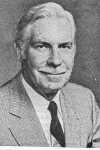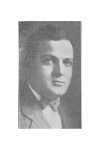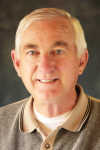Ninety years of Rotary in McCook
Monday, April 28, 2014

Ben Hormel, McCook's Mr. Rotarian
This year the McCook Rotary Club s once again hosting a District Conference, at which we will honor yet another District Governor, Duane Tappe. Our club can be justly proud that we have been represented by a fellow like Duane, who lives the Rotary Four Way Test, and practices the Rotary mottoes, "he Profits Most Who Serves Best," and "Service Above Self."
Over the years we've been fortunate to have had a number of outstanding leaders who have held the position of District Governor. We've not yet had a lady from our club, but I'm sure that it is only a matter of time before we'll be able to claim that honor as well.
Today I thought it might be interesting to look back at a bit of our Rotary history, and introduce you to a few of the fellows who were closely tied to the McCook Rotary Club:

McCook Rotary's First Treasurer, Bill Bullard
On Feb. 1, 2012 The Rotary Club celebrated its 90th year in McCook. While the Rotary Club International was founded in 1905, McCook did not come to the table until 1922, with the establishment its own Rotary Club.
In 1905 Paul Harris, a struggling attorney in Chicago, had a bright idea, which he shared with three friends one day, while they were having lunch. He proposed that they should form a social club, rotating their meetings among the members. They would support each other's businesses, and to avoid conflicts, would limit their membership to one member from each business category, at the time a lawyer, an engineer, a coal dealer, and a tailor. With those four members, and those four business categories, Rotary was founded.
Before long the original members and their friends decided that Rotary needed something more, which led to Rotary becoming a service organization. Their first service projects were 1. To replace a Joliet, Illinois preacher's horse, which had died, leaving him with no means to call upon his parish members. 2. To provide two public restrooms for their hometown of Chicago.

District Governor Duane Tappe
The idea of service organizations at that time was mainly the domain of the churches, and having a service organization made up of business men was a rather new concept. Soon business men across the nation began to inquire about having a Rotary Club in their communities. To the surprise of Paul Harris and the other original members, people in other countries liked Rotary's ideas, expressed in their two mottos, "Service Above Self," and "He Profits Most Who Serves Best." Folks (men) in foreign countries began to want Rotary Clubs as well -- and presto! Rotary International (RI) was born.
Rotary International really began to take off during the period between World War I and World War II, but during World War II the formation of new clubs, especially in the Axis aligned nations (where Hitler viewed Rotary as an enemy to the Third Reich) virtually came to a complete halt. Renewed Rotary activity around the world resumed again with peace in the world, and has continued, largely unabated, to the present day.
On Feb. 1, 1922 the McCook Rotary Club received its official charter. John D. Fuller, of the Hastings Rotary Club had been dispatched by District Governor, Luther A. Brewer, to do a survey of the McCook community, to determine if McCook might be the location of a Rotary Club. Mr. Fuller's survey found that McCook was a lively trade center of more than 20,000 people. The town had an active Chamber of Commerce, and had a suitable place for the Rotary Club to meet---the Monte Cristo Hotel. In McCook he found that there were 11 physicians, 11 attorneys, four dentists, four manufacturing plants, four banks, two schools, 30 retail stores, nine churches, two hotels, plus one new hotel under construction, three newspapers, and one railroad. He found that there were 85 classifications available for membership in Rotary. He further noted that McCook had a very progressive set of business men, and the finest band in the state, The Burlington Band, under of direction of H.P. Sutton, who had formerly been a leader of the Ringling Brothers Circus Band. He heartily recommended McCook for Rotary.
On McCook's part, business leaders, in return, embraced Rotary with much enthusiasm, especially the social parts of Rotary, meeting regularly for lunch with friends, as equals, and learning more about each other's business. This was reflected in the fines that were collected at meetings -- 25 cents for failure to wear a name tag, 10 cents for calling a member by his last name or using the prefix of Mr. or Dr., and a whopping 50 cents for being absent from a meeting. At one meeting that first year a dollar and 10 cents was collected, to be used for club projects -- and those fines added up. That first year the Club donated $100 to the YMCA fund, for the new Y, which was just under construction.
The new Rotary Club attracted many of McCook's leading businessmen -- Marvin Summerville, President, Weller DeGroff, Vice President, Lloyd Jennings, Secretary, and Bill Bullard, Treasurer. Included in the list of Charter members were Newsman, Harry Strunk, Jeweler, Harold Sutton, Railroader, Harry Culbertson, Attorney, Historian, John Cordeal, and Baker, Lloyd Slauter. In spite of the lure of having lunch with friends each week, the rule that called for perfect attendance (there were excused absences) was too much for some of the members. By the end of the year Lloyd Slauter and Harry Culbertson had already accumulated more than four absences and were bounced from the club's roster.
Soon, McCook's Rotary got into the swing of doing good for McCook and individual citizens. In 1923 the Rotary Club spearheaded a big drive for $38,000, McCook's half of the needed $75,000 for the new St. Catherine's Hospital. At the other end of the scale, the members passed the hat and raised $150 to send the Boy Scouts to camp at Champion Lake.
In those early days, there was a good bit of good-natured bantering between the Rotary Club and the Kiwanis Club, the other service club in McCook. The annual softball game between the two clubs was an occasion, drawing a big crowd of spectators. But the two clubs often collaborated on social events and community projects, and when Frank Hamilton was elected Rotary District Governor, the Kiwanians held a dinner in his honor and took out a large ad in the Gazette congratulating him and expressing their pride in his achievement.
Over the years the McCook Club has been supportive of RI's projects -- among which:
1. The eradication of Polio from the earth.
2. The promotion of International Education, with the sponsorship of exchange groups of students to most of the countries of the world.
3. The International Studies for Peace.
4. The fight against illiteracy in the World's poorer countries.
To help fund these causes a number of the McCook Club members have become "Paul Harris Fellows," with their contributions to the Rotary International Foundation, joining world renown leaders like humanitarian, Albert Schweitzer, composer Jean Sibelius, author, Thomas Mann, and Philippine President, Carlos Romulus in promoting Rotary's goals.
But McCook's Rotary Club stays vitally interested in our local community. Members have very much enjoyed hosting foreign exchange students and adult study groups from abroad. Locally, the list of contributions to local causes is long, including Habitat for Humanity, RYLA (Rotary Youth Leadership Association), with scholarships for McCook youth to attend camp at Halsey Forest in the summer, Teacher of the Year, McCook Heritage Days, The Ben Hormel Scholarships, sponsorships of Cub, Boy Scouts, and Girls Scouts, Highway Clean-up, Dictionaries for 3rd graders, and The Toy Box, among many other projects. This year the McCook Rotary Club was the lead organization of McCook's "First Night" celebration.
Over the years Rotary has helped produce a large number of community leaders. Several McCook members have become Rotary District Governors, and Frank Morrison used his experience as District Governor to launch his political career as Nebraska's Governor. To date, McCook has just one of its members, Ben Hormel, who went on to hold an office in Rotary Int.
Surely, one of the most significant events in the Club's 90-year history was the acceptance of women into the Club, in 1987 (with a bit of encouragement of the US Supreme Court). For a number of years women had attempted to integrate the Rotary Club, but had always been rejected. One notable case was Attorney Sally Cunningham, a leader in the struggle for equal rights for women and the National President of The Federation of Business and Professional Women's Clubs, who repeatedly made application for membership, and each time was rebuffed. When the Supreme Court ruling made women members mandatory Sally was invited to join the McCook Club. She answered the invitation with a forceful "No Thanks." Since 1987 women have become important to the success of the McCook Club, and Rotary Int.
It is with a great feeling of optimism, hope, and determination that the McCook Rotary Club looks forward to its 100th birthday, in 1922, to the complete eradication of polio from the earth, better understanding between nations, and the betterment of the City of McCook.

